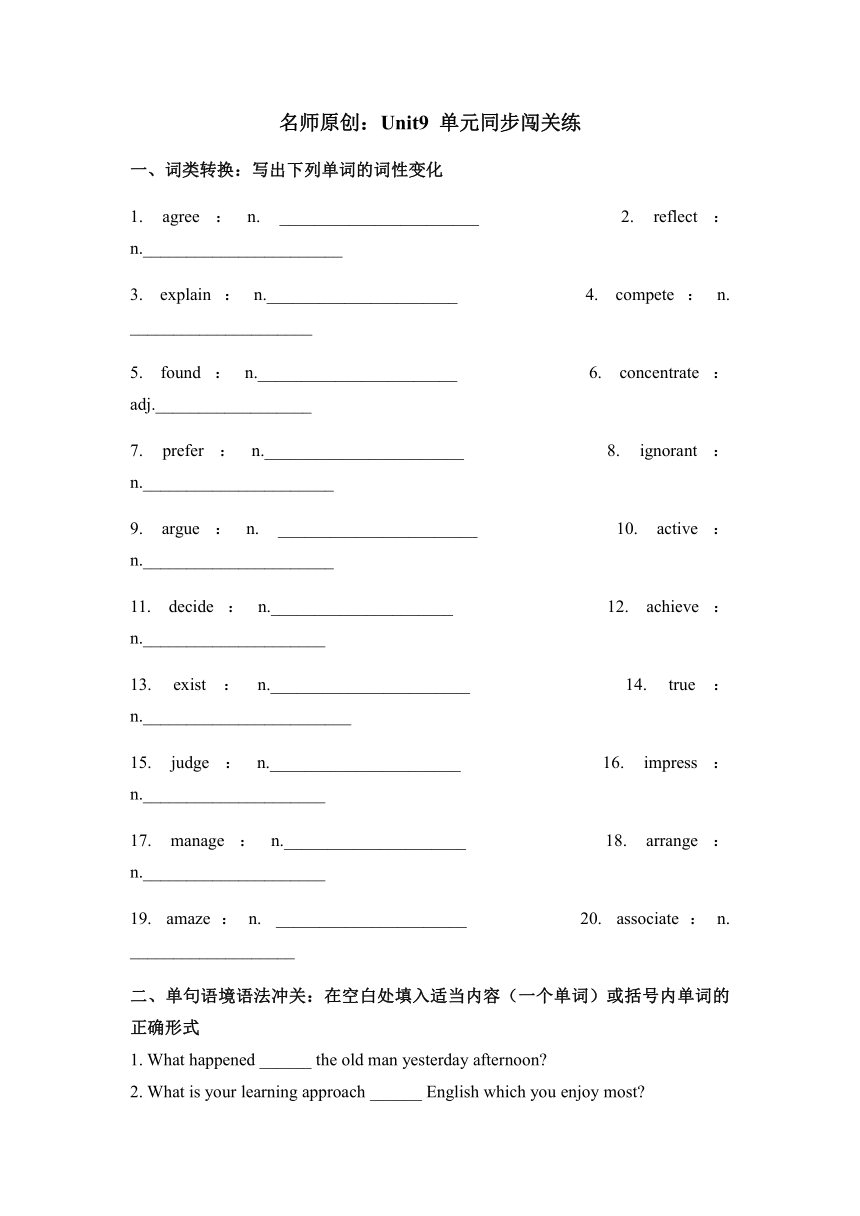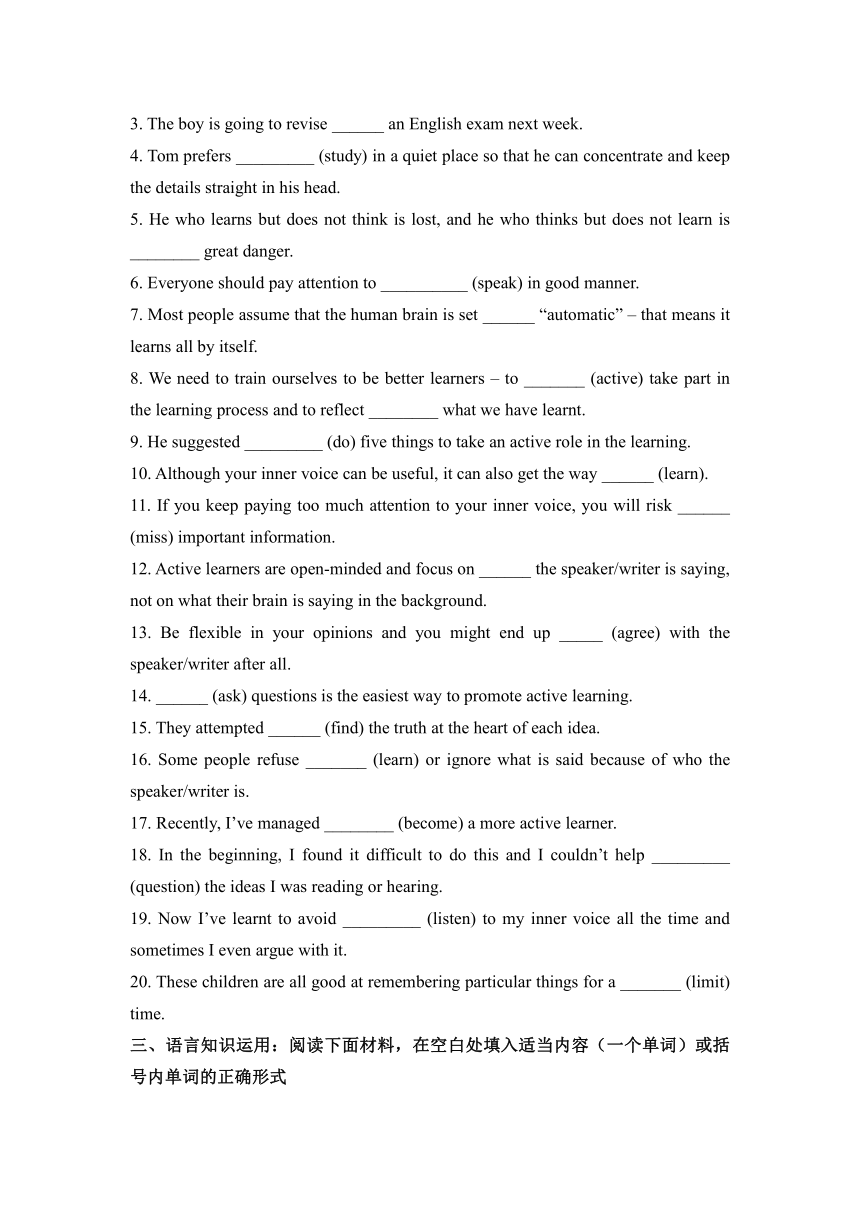北师大版(2019)必修第三册 Unit9 Learning 单元同步词汇闯关练 (含答案)
文档属性
| 名称 | 北师大版(2019)必修第三册 Unit9 Learning 单元同步词汇闯关练 (含答案) |  | |
| 格式 | docx | ||
| 文件大小 | 25.0KB | ||
| 资源类型 | 教案 | ||
| 版本资源 | 北师大版(2019) | ||
| 科目 | 英语 | ||
| 更新时间 | 2022-09-28 09:43:12 | ||
图片预览


文档简介
名师原创:Unit9 单元同步闯关练
一、词类转换:写出下列单词的词性变化
1. agree:n. _______________________ 2. reflect:n._______________________
3. explain:n.______________________ 4. compete:n. _____________________
5. found:n._______________________ 6. concentrate:adj.__________________
7. prefer:n._______________________ 8. ignorant:n.______________________
9. argue:n. _______________________ 10. active:n.______________________
11. decide:n._____________________ 12. achieve:n._____________________
13. exist:n._______________________ 14. true:n.________________________
15. judge:n.______________________ 16. impress:n._____________________
17. manage:n._____________________ 18. arrange:n._____________________
19. amaze:n. ______________________ 20. associate:n. ___________________
二、单句语境语法冲关:在空白处填入适当内容(一个单词)或括号内单词的正确形式
1. What happened ______ the old man yesterday afternoon
2. What is your learning approach ______ English which you enjoy most
3. The boy is going to revise ______ an English exam next week.
4. Tom prefers _________ (study) in a quiet place so that he can concentrate and keep the details straight in his head.
5. He who learns but does not think is lost, and he who thinks but does not learn is ________ great danger.
6. Everyone should pay attention to __________ (speak) in good manner.
7. Most people assume that the human brain is set ______ “automatic” – that means it learns all by itself.
8. We need to train ourselves to be better learners – to _______ (active) take part in the learning process and to reflect ________ what we have learnt.
9. He suggested _________ (do) five things to take an active role in the learning.
10. Although your inner voice can be useful, it can also get the way ______ (learn).
11. If you keep paying too much attention to your inner voice, you will risk ______ (miss) important information.
12. Active learners are open-minded and focus on ______ the speaker/writer is saying, not on what their brain is saying in the background.
13. Be flexible in your opinions and you might end up _____ (agree) with the speaker/writer after all.
14. ______ (ask) questions is the easiest way to promote active learning.
15. They attempted ______ (find) the truth at the heart of each idea.
16. Some people refuse _______ (learn) or ignore what is said because of who the speaker/writer is.
17. Recently, I’ve managed ________ (become) a more active learner.
18. In the beginning, I found it difficult to do this and I couldn’t help _________ (question) the ideas I was reading or hearing.
19. Now I’ve learnt to avoid _________ (listen) to my inner voice all the time and sometimes I even argue with it.
20. These children are all good at remembering particular things for a _______ (limit) time.
三、语言知识运用:阅读下面材料,在空白处填入适当内容(一个单词)或括号内单词的正确形式
Chinese are enjoying greater ___1____ (convenient)in making outbound trips and more visa-free travel options, ____2____ mirrors the country’s economic ____3____ (grow) and increasing confidence and openness over the last 70 years.
According to the National Immigration Administration (NIA), about 1. 05 billion outbound trips ___4___ (make)by Chinese mainland residents from 2009 to 2018, ____5_____ over 160 million in 2018 alone. In comparison, around 330 million trips were made between the year 1978, when China started ____6____ (it) reform and opening-up, and 2008.
The figure was about 17 million in the first three decades since the __7___ (found)of the People’s Republic of China in 1949. The country’s policies on citizens’ private outbound trips have changed from being restrictive to ___8___ (gradual) easing and are now quite convenient, said Min Haiyun, head of the exit-entry department of the NIA.
The number of Chinese passport holders has grown rapidly over the past 70 years, he said.
In ___9___ first three decades since 1949, about 210, 000 passports were issued. In 2017, 26. 74 million passports were issued, up 372. 3 percent from 5. 66 million in 2007, and it surged to 30. 08 million in 2018.
Today, around 13 percent of the mainland residents have held valid regular passports, and the number is expected ___10___ (exceed) 200 million at the end of 2019.
1.________________ 2.________________ 3.________________ 4.________________ 5.________________ 6.________________ 7.________________ 8.________________ 9.________________ 10._______________
四、写作
假定你是王琳, 你的英国朋友Alice来信询问你的暑假实践活动安排。请回邮件告知你的打算。内容包括:
1. 看望老人, 学做家务; 2. 学打羽毛球; 3. 参加社区文艺演出。
注意: 1. 词数100左右; 2. 可以适当增加细节, 以使行文连贯。
Dear Alice,
Yours,
Wang Lin
参考答案:
一、词类转换:
1. agreement; 2. reflection; 3. explanation; 4. competition; 5. foundation; 6. concentration; 7. preference; 8. ignorance; 9. argument; 10. activity; 11. decision; 12. achievement; 13. existence; 14. truth; 15. judgment; 16. impression; 17. management; 18. arrangement; 19. amazement; 20. association
二、语境词汇冲关:
1. to; 2. to; 3. for; 4. to study; 5. in; 6. speaking; 7. on; 8. actively, on/upon; 9. doing; 10 . to learn/of learning; 11. missing; 12. what; 13. agreeing; 14. Asking; 15. to find; 16. to learn; 17. to become; 18. questioning; 19. listening; 20. limited
三、语言知识运用:
1. convenience;2. which;3. growth;4. were made;5. with;6. its;7. founding;9. the;10. to exceed
四、写作
Dear Alice,
I’m glad to hear from you again and really appreciate your summer plans. Actually, I’ve already informed my parents of my schedule, which they think highly of.
What I want to do first is to visit my grandparents, learning how to do household chores like cooking and cleaning out a room. Badminton is my favorite game. I will learn from Wang Lei, the best player in my class, and practice with him in the nearby gym three times a week. Most excitingly, I am chosen to perform in the art center of our community every Friday evening. As a young pianist, I feel it my honor to show my talent in the neighborhood.
Hope you will enjoy your summer vacation too!
Yours,
Wang Lin
一、词类转换:写出下列单词的词性变化
1. agree:n. _______________________ 2. reflect:n._______________________
3. explain:n.______________________ 4. compete:n. _____________________
5. found:n._______________________ 6. concentrate:adj.__________________
7. prefer:n._______________________ 8. ignorant:n.______________________
9. argue:n. _______________________ 10. active:n.______________________
11. decide:n._____________________ 12. achieve:n._____________________
13. exist:n._______________________ 14. true:n.________________________
15. judge:n.______________________ 16. impress:n._____________________
17. manage:n._____________________ 18. arrange:n._____________________
19. amaze:n. ______________________ 20. associate:n. ___________________
二、单句语境语法冲关:在空白处填入适当内容(一个单词)或括号内单词的正确形式
1. What happened ______ the old man yesterday afternoon
2. What is your learning approach ______ English which you enjoy most
3. The boy is going to revise ______ an English exam next week.
4. Tom prefers _________ (study) in a quiet place so that he can concentrate and keep the details straight in his head.
5. He who learns but does not think is lost, and he who thinks but does not learn is ________ great danger.
6. Everyone should pay attention to __________ (speak) in good manner.
7. Most people assume that the human brain is set ______ “automatic” – that means it learns all by itself.
8. We need to train ourselves to be better learners – to _______ (active) take part in the learning process and to reflect ________ what we have learnt.
9. He suggested _________ (do) five things to take an active role in the learning.
10. Although your inner voice can be useful, it can also get the way ______ (learn).
11. If you keep paying too much attention to your inner voice, you will risk ______ (miss) important information.
12. Active learners are open-minded and focus on ______ the speaker/writer is saying, not on what their brain is saying in the background.
13. Be flexible in your opinions and you might end up _____ (agree) with the speaker/writer after all.
14. ______ (ask) questions is the easiest way to promote active learning.
15. They attempted ______ (find) the truth at the heart of each idea.
16. Some people refuse _______ (learn) or ignore what is said because of who the speaker/writer is.
17. Recently, I’ve managed ________ (become) a more active learner.
18. In the beginning, I found it difficult to do this and I couldn’t help _________ (question) the ideas I was reading or hearing.
19. Now I’ve learnt to avoid _________ (listen) to my inner voice all the time and sometimes I even argue with it.
20. These children are all good at remembering particular things for a _______ (limit) time.
三、语言知识运用:阅读下面材料,在空白处填入适当内容(一个单词)或括号内单词的正确形式
Chinese are enjoying greater ___1____ (convenient)in making outbound trips and more visa-free travel options, ____2____ mirrors the country’s economic ____3____ (grow) and increasing confidence and openness over the last 70 years.
According to the National Immigration Administration (NIA), about 1. 05 billion outbound trips ___4___ (make)by Chinese mainland residents from 2009 to 2018, ____5_____ over 160 million in 2018 alone. In comparison, around 330 million trips were made between the year 1978, when China started ____6____ (it) reform and opening-up, and 2008.
The figure was about 17 million in the first three decades since the __7___ (found)of the People’s Republic of China in 1949. The country’s policies on citizens’ private outbound trips have changed from being restrictive to ___8___ (gradual) easing and are now quite convenient, said Min Haiyun, head of the exit-entry department of the NIA.
The number of Chinese passport holders has grown rapidly over the past 70 years, he said.
In ___9___ first three decades since 1949, about 210, 000 passports were issued. In 2017, 26. 74 million passports were issued, up 372. 3 percent from 5. 66 million in 2007, and it surged to 30. 08 million in 2018.
Today, around 13 percent of the mainland residents have held valid regular passports, and the number is expected ___10___ (exceed) 200 million at the end of 2019.
1.________________ 2.________________ 3.________________ 4.________________ 5.________________ 6.________________ 7.________________ 8.________________ 9.________________ 10._______________
四、写作
假定你是王琳, 你的英国朋友Alice来信询问你的暑假实践活动安排。请回邮件告知你的打算。内容包括:
1. 看望老人, 学做家务; 2. 学打羽毛球; 3. 参加社区文艺演出。
注意: 1. 词数100左右; 2. 可以适当增加细节, 以使行文连贯。
Dear Alice,
Yours,
Wang Lin
参考答案:
一、词类转换:
1. agreement; 2. reflection; 3. explanation; 4. competition; 5. foundation; 6. concentration; 7. preference; 8. ignorance; 9. argument; 10. activity; 11. decision; 12. achievement; 13. existence; 14. truth; 15. judgment; 16. impression; 17. management; 18. arrangement; 19. amazement; 20. association
二、语境词汇冲关:
1. to; 2. to; 3. for; 4. to study; 5. in; 6. speaking; 7. on; 8. actively, on/upon; 9. doing; 10 . to learn/of learning; 11. missing; 12. what; 13. agreeing; 14. Asking; 15. to find; 16. to learn; 17. to become; 18. questioning; 19. listening; 20. limited
三、语言知识运用:
1. convenience;2. which;3. growth;4. were made;5. with;6. its;7. founding;9. the;10. to exceed
四、写作
Dear Alice,
I’m glad to hear from you again and really appreciate your summer plans. Actually, I’ve already informed my parents of my schedule, which they think highly of.
What I want to do first is to visit my grandparents, learning how to do household chores like cooking and cleaning out a room. Badminton is my favorite game. I will learn from Wang Lei, the best player in my class, and practice with him in the nearby gym three times a week. Most excitingly, I am chosen to perform in the art center of our community every Friday evening. As a young pianist, I feel it my honor to show my talent in the neighborhood.
Hope you will enjoy your summer vacation too!
Yours,
Wang Lin
同课章节目录
- Unit 7 Art
- Lesson 1 Masterpieces
- Lesson 2 Beijing Opera
- Lesson 3 A Musical Genius
- Unit 8 Green living
- Lesson 1 Roots and Shoots
- Lesson 2 Greening the Desert
- Lesson 3 "White Bikes" on the Road
- Unit 9 Learning
- Lesson 1 Active Learning
- Lesson 2 Language Learning Tips
- Lesson 3 The Secrets of Your Memory
